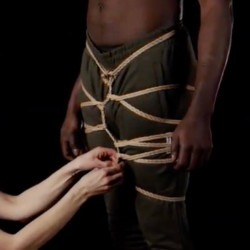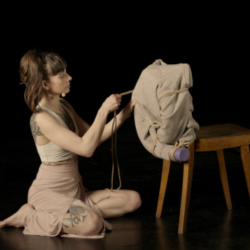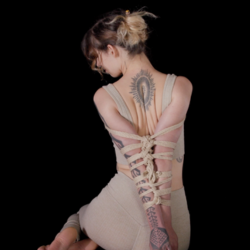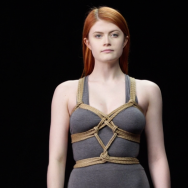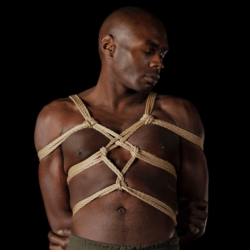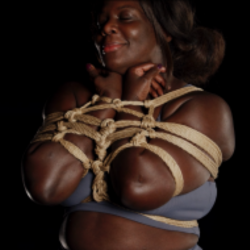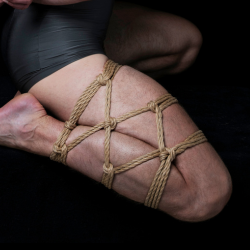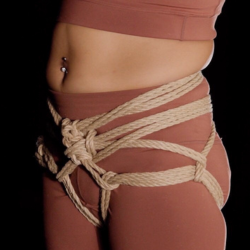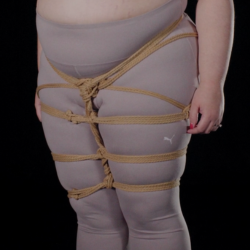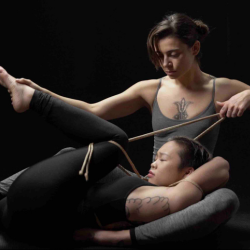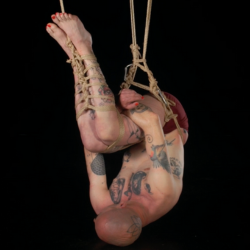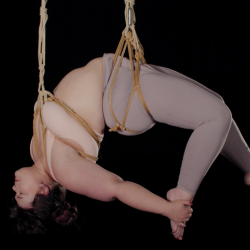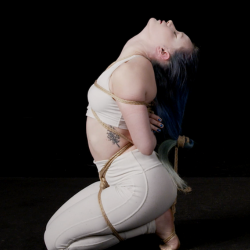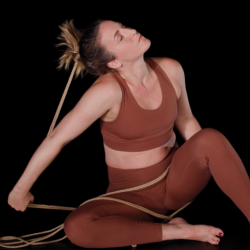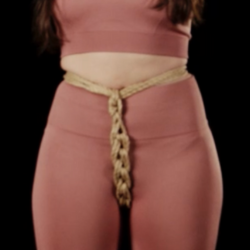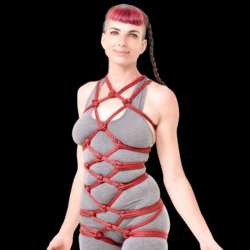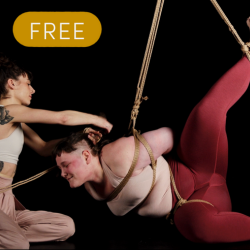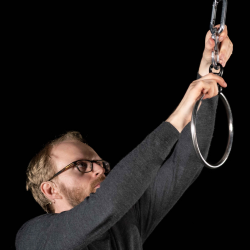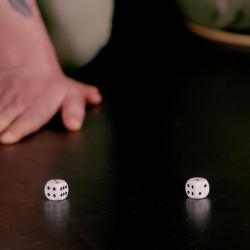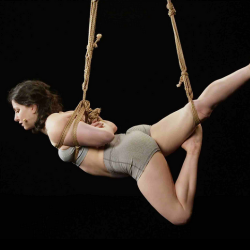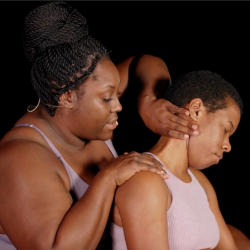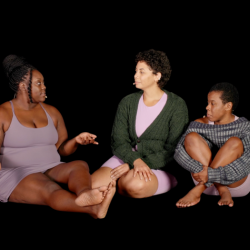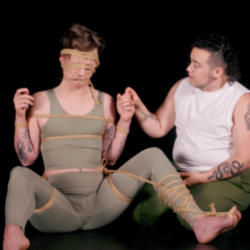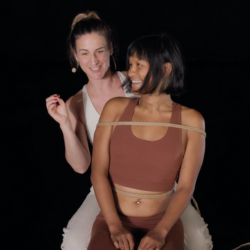EP 20
MR. GOAT / MADALIMNE
In this episode, Mr. Goat and Madalimne discuss their journey into rope bondage and their exploration of pain and sadism within it.

Mr. Goat and Maladimne have been together and exploring rope bondage for nearly 6 years. Ambitious, sensual, and sadistic, their shared rope is deeply personal as an intimate and creative practice. Their pursuit of rope education has taken them across the US, and recently to Europe. Together, they run Goat Manor; a rope studio in Portland, Oregon. They host rope jams, traveling teachers, and performances.
Wicked Wren [00:00:12] Hello everyone, and welcome to the Shibari Study podcast. I'm your host Wicked Wren and today I have on Mr. Goat and Madelimne. Goat uses he/him pronouns and Madelimne uses she/her pronouns. They're both based in the Pacific Northwest. They have an ambitious, sensual and (…) rope practice that they share together. Their pursuit of rope education has taken them across the US and they recently went to Europe.
Mr. Goat [00:00:37] Yay.
Wicked Wren [00:00:38] I'm excited talking to you.
Madalimne [00:00:39] Thank you.
Wicked Wren [00:00:40] Earlier, we were talking and you said that you have a 60s French pop playlist that you do rope to.
Madalimne [00:00:47] Yes, it is one that we definitely have on repeat with some of the greats like Serge Gainsbourg and what's this guy's name?
Mr. Goat [00:00:58] Jacque Dutronc.
Wicked Wren [00:00:59] Oh, my God.
Madalimne [00:01:00] Jacque Dutronc, yeah.
Wicked Wren [00:01:01] I would have never been able to say it. What is 60s Pop? How do you even find 60s French pop? I don't even even know that existed as a thing.
Mr. Goat [00:01:12] I think I was just looking for creepy things to play while we were doing rope one day. And I remembered the Serge Gainsbourg and Brigitte Bardot, Bonnie and Clyde song, and I played it and it was a big hit. So we just started compiling 60s French pop music to tie to them.
Wicked Wren [00:01:34] I love it.
Mr. Goat [00:01:35] Really became a theme around the, around the studio for a long time. Still is on occasion.
Wicked Wren [00:01:39] Yeah, well, I think that it's better than like 2000s industrial metal, but generally –
Madalimne [00:01:48] Rammstein, what is this Rammstein slander?
Wicked Wren [00:01:51] Not slander, I'm just saying that maybe some variation in dungeons would be nice. I don't need to hear Drowning Pool for the eighth time.
Mr. Goat [00:01:59] So why not just go with the Twin Peaks, the Twin Peaks soundtrack?
Madalimne [00:02:04] Oh my God.
Mr. Goat [00:02:04] It's premade awesome rope music.
Wicked Wren [00:02:07] I mean, I feel like if I did that, I would have a nervous breakdown.
Madalimne [00:02:11] Oh.
Mr. Goat [00:02:13] I see. Raw emotion.
Wicked Wren [00:02:16] So you two have been playing together for about six years, right?
Madalimne [00:02:20] Yeah.
Wicked Wren [00:02:20] How did you meet?
Mr. Goat [00:02:23] Well, a little-known website named Tinder.
Madalimne [00:02:25] Tinder.
Wicked Wren [00:02:26] I've heard about it.
Madalimne [00:02:28] Yes.
Mr. Goat [00:02:29] In the hallows of the evening.
Madalimne [00:02:31] Yes, it was a dark and (…) night. And I don't know. You sent me a message about my rug tattoo and said it really pulled the arm together and –
Wicked Wren [00:02:46] That is brilliant.
Madalimne [00:02:47] And it worked.
Wicked Wren [00:02:49] Everyone take note. That's so good.
Mr. Goat [00:02:52] No, it is actually, yeah. I mean, The Big Lebowski sort of came through for us. And we just actually had a dinner at a Big Lebowski-themed restaurant in Reykjavik, Iceland, which was –
Madalimne [00:03:04] It was really cute. A little full-circle moment.
Wicked Wren [00:03:07] When were you in Iceland?
Madalimne [00:03:10] A couple of weeks ago. On our way back from Europe. We spent a month in France and nearby locales doing rope stuff.
Madalimne [00:03:18] We're going to talk about all this. But I'm just curious what you do on the first date.
Madalimne [00:03:25] So we met at like this kind of like local Cuban restaurant. And I think we got through like, I think he finished an espresso and we forgot to order a lunch and just left.
Madalimne [00:03:42] Espresso.
Mr. Goat [00:03:44] No lunch was had.
Madalimne [00:03:45] No lunch was had.
Wicked Wren [00:03:48] I love it.
Madalimne [00:03:48] And then we spent the next six years getting to know each other really well.
Wicked Wren [00:03:52] Did you ever have lunch together? Did that ever happen again or...
Mr. Goat [00:03:55] No, we still don't. At least we had lunch together today actually.
Madalimne [00:03:59] No, actually, it was, yeah, it was very instantaneous connection. Like, I really like when I, he was really cute about it. He, like, set himself at the very back of the restaurant with, like, his back facing the door. So I couldn't, like, see him, you know, like his face. And so I had to, like, go around him and I sat down and like, he just has these, like, piercing blue eyes. Yeah, it was pretty over immedietaly.
Wicked Wren [00:04:25] You're like, I'm done, I'm done actually.
Madalimne [00:04:27] I was like, This is good. This is fine. Let's go.
Wicked Wren [00:04:32] Did you two both do rope, like, independently, or did you find rope together?
Mr. Goat [00:04:39] I've been doing it for a couple of years beforehand, but the sort of bedroom stuff. I've taken a couple of rope classes with a local guy named Noble, who was a wonderful teacher, but I wasn't really that into it. It took too long to tie and it didn't really make any sense why people would do it to me. So it wasn't a big thing. And then when I met Madalimne, we started playing around with it together. But I think both of us had our (…) ideas about what rope was from Tumblr. And yeah, so we started taking classes together and it all started to click for us.
Wicked Wren [00:05:19] We mentioned Tinder, Tumblr, I mean, I feel like there's only a couple more things in there we can mention, you know, like we win like a bingo card or something for like the rope starter pack.
Madalimne [00:05:29] Oh, yeah. Yeah.
Wicked Wren [00:05:31] So you said that it took too long to tie. What did you mean?
Mr. Goat [00:05:36] Yeah, but I mean. So if you come from the world of using, like, leather restraints.
Wicked Wren [00:05:43] Got it.
Mr. Goat [00:05:44] You know, you buckle them on and put something on a bed and you're good to go. Get down to business. Whereas with rope, it sort of... You don't know how to tie knots. You don't know how to properly do things. It takes forever. And the rope is always way too long when you're first starting out. You know, like 30 feet of rope is way too much.
Wicked Wren [00:06:03] That is a funny thing. I haven't thought about that. Most people's rope is way too long in the beginning.
Mr. Goat [00:06:09] Way too long, yeah. I think my first piece of rope was hemp rope from Twisted Monk, and it was like 36 feet long or something ridiculous like that.
Wicked Wren [00:06:18] Yeah, I wonder if that's because people are afraid or running out of rope.
Mr. Goat [00:06:23] Yeah, well, you just, you figure you need a lot. You don't. And then you don't know you're doubling it up. And then when you figure that out, you're like, I need twice as much.
Wicked Wren [00:06:32] Yeah.
Madalimne [00:06:33] I didn't know anything about rope when I met a Goat, actually. Like, it wasn't... Like it wasn't even in my like (…)view of things. So it was, like, totally brand new.
Wicked Wren [00:06:47] Mh-hm.
Madalimne [00:06:48] So I feel like I was, I mean, I was primarily introduced to like the (…) scene from him. Like, I was familiar with it, like, conceptually, but not necessarily like the whole underworld of (…) actually is.
Mr. Goat [00:07:05] You were a private actor.
Madalimne [00:07:06] Yes, I was a private actor, but yeah. So I got introduced to it through him and we started taking classes with no ball here in town and it was just yeah, another one of the like love at first sight, kind of feeling. Like it was brand new and different and like even from the beginning, even though patience was also an issue for me too, it still is like it's a striking like experience to have with someone so.
Wicked Wren [00:07:38] What do you mean with patience was an issue for you in the beginning?
Madalimne [00:07:42] Like almost kind of just like the sitting still waiting for something to happen feeling. I feel like it has taken, I don't know, like the reason why you're sitting there doing a thing. Kind of like, it's something I've had to like, learn over and over again. And at first it was like, I'm doing this because he likes me and I like him and this is really cute and (…). And then you kind of are like, okay, we're sitting here for 20 minutes tying this thing over and over again. Like, when does the (…) part start?
Wicked Wren [00:08:17] Yeah.
Madalimne [00:08:19] And then over time, I feel like I kind of like, you find the practice together and then that's like the intimacy part. So just at first, like kind of getting into the groove, like, what is robe bondage? Why am I doing this? Like... And yeah, I'm just like, that's kind of how it started.
Wicked Wren [00:08:41] Do you feel like you found the why at this point?
Madalimne [00:08:43] Oh, yeah. Oh, yeah, totally. And like, found it multiple like times over. And it's always been like, something like, that's kind of like a my big question. Even when, like, I'm tied up sometimes, like, suspended, like, in pain, I'm doing the suffering. I'm like why am I doing this?
Wicked Wren [00:09:02] Yes, I feel like, I feel that every time I'm about to tie, I'm like, why am I doing this? This is this going to hurt? Can you tell me? Go on. Sorry.
Madalimne [00:09:13] Oh, no. What were going to say?
Wicked Wren [00:09:15] Can you tell me about the couple of why's that you had? Like, how has it changed over time?
Madalimne [00:09:20] I think that, like. It's a really good question. So it definitely started as like flirtatious curiosity, right. Because like, here's like this new domly man who wants to tie me up. And then like, but then we like, are learning it together, right. So it's like not just the experience of doing it that's like bonding or whatever, but also learning it together started becoming like a factor in it.
Mr. Goat [00:09:54] Yeah.
Madalimne [00:09:54] And like finding. Oh my gosh, how do I even say this? Like confronting that why in suspension, like every single time and over and over, just getting to like deeper levels of truth. Like who I am when I'm in pain? How am I going to behave under these conditions? Like, am I going to, like, reach out with love or shut into myself? And like, it just becomes this whole world of, like, self-exploration. So yeah.
Wicked Wren [00:10:26] If you feel comfortable answering when you're in pain, do you go inside or do you reach out with like love or anger or like?
Madalimne [00:10:36] It definitely changes. Like, I think that one of the things I have learned about rope is that it's never what I think it's going to be or like what I think a rope scene should feel like is not ever in the reality of what I'm confronted with. And so like each time, it's just like an opportunity to observe whatever my reactions are kind of in the moment. So like, sometimes if I'm like, really troubled or have a lot on my mind, I can like get a little internal. But generally, I feel like I'm very expressive, which is honestly, it's on a whole other tangent. Like being a very expressive rope bottom in pain is kind of like a, I don't know, I feel like there's stuff around that, but.
Wicked Wren [00:11:27] Yeah. Agreed. I like what you said about observing the feelings and saying like, Wow, that exists there. Instead of prescribing it a bunch of things.
Madalimne [00:11:38] Mm-hmm. Yeah. It's like, I don't know, I feel like things get so much harder in an active, like, suspension if I'm trying to edit or curtail or modify my reactions to fit an idea rather than just like seeing the feelings happening. And one of the cool things about rope, I think, is that you can kind of play with reactivity is like, Am I going to allow myself, allow myself to start being reactive or am I going to try to like, I don't know, mental my way out, like through this? So.
Wicked Wren [00:12:17] Yeah, I find that I do that as well when I'm in rope. And I find that if I can keep the reactions inside, I can last longer in a scene because once they start coming out, then my meter starts to kind of chip down I feel like.
Madalimne [00:12:32] Because like once the reactivity starts going, it's like the, like the animal brain is like, okay, like, here we go expressing. And then your energy gets used really fast.
Wicked Wren [00:12:42] Do you have a mantra that you tell yourself when something is really bad? Like, how do you get through it?
Madalimne [00:12:48] I guess it depends on the kind of pain. It really depends.
Wicked Wren [00:12:54] How do you define pain?
Madalimne [00:12:56] Oh, my gosh. You know, just little, the little things. Just little questions and... Oh, my God. There's like, so many different kinds of pain and rope and it takes a really long time, I think, to kind of categorize those things.
Wicked Wren [00:13:16] Yeah.
Madalimne [00:13:18] There's like bone pain, which to me is like an absolute no-go. Like if I'm feeling like, well, I'm getting a little better at it. But usually, if I feel something that feels really bony, that's like an agony. Like can't handle. Yeah, but like a meaty sort of pain, I think that's something that's like easier to kind of process.
Mr. Goat [00:13:43] Pinchy.
Madalimne [00:13:43] Oh, pinchy pain. That stuff is really annoying.
Wicked Wren [00:13:46] I hate pinchy.
Madalimne [00:13:47] I know that's just... But also I get a little bit of pride when like, I can see that he's doing something, obviously, pinchy and I'm kind of holding my arms like this because the Tenshis are the ones that are the most pinchiest. But when I can kind of be like (visual motion of avoiding it)
Wicked Wren [00:14:03] Yes.
Madalimne [00:14:03] I'm not going to let it win.
Wicked Wren [00:14:06] Yes.
Madalimne [00:14:08] But as far as big mantras go. Oh. No. I guess it just happens in the moment. You know, sometimes, like I talk to me or like to tell me what he's doing or, like thinking about because it kind of helps reground and like, give purpose to it.
Wicked Wren [00:14:28] Amazing.
Mr. Goat [00:14:31] Dad jokes don't help.
Wicked Wren [00:14:31] No, dad jokes don't really help.
Wicked Wren [00:14:33] I find that that would make me upset. I got to be honest. Like.
Madalimne [00:14:38] Like this is no laughing matter.
Mr. Goat [00:14:40] I hope they are appropriate at any moment.
Wicked Wren [00:14:42] Yeah. Then Madalimne is like upside down in a futo. She's like, Maybe not the funniest, you know? So Mr. Goat, you're pretty (…) or like, how does that work?
Mr. Goat [00:14:53] I think we started off with Noble, who I believe teaches like something inspired by Yukimura caressing style. It's very about each moment and putting her up on the body and expressing control. And so that's where we started off and then shortly after getting through his curriculum, we ended up tying in an intensive with a person named Sven, who – you were there, as a matter of fact. And their style is amazing. They studied a lot under Tifereth who teaches, whose rope style is amazing and performative and very dramatic and dynamic. And that kind of really appeals to us. It's been part of our journey ever since running in this thing. And then Fuoco after that. And then somewhere along the way, we started picking up some more (…) style, like some semenawa-based stuff with, you know, based on what Naka Akira does. And so our rope journey has been pursuing both sides of that thing and then trying to pull them together in as much as we can to find new expression and stuff there.
Madalimne [00:16:22] Mm-hmm.
Wicked Wren [00:16:23] Have you two always like to confront pain or has rope been maybe, like, shown you that you could confront pain or have that always existed in both of your lives or something like that? Does that make sense?
Madalimne [00:16:39] Yeah. Yeah, I guess.
Mr. Goat [00:16:43] One of the coolest, one of the coolest things that I learned and it was actually from Sven that first weekend was how to tie the Guatemalan shin (…). And that really got to me for the reason I love rope, which is, it's really mean. It can be very (…).
Wicked Wren [00:17:05] Yeah.
Mr. Goat [00:17:06] I'm, I'm a (…) in my other (…) play and so that sort of ability to bring pain into a rope scene and to maintain it and to sort of gently blow on it like a little fire or something like that. The work in rope has been something that we've been looking to explore more deeply with our rope all along and also then remove out of our rope those incidental pains that you don't really intend.
Wicked Wren [00:17:37] That's a good point.
Mr. Goat [00:17:38] That's been the quest to get to get rid of the bad pain and bring in the good pain.
Madalimne [00:17:43] Yeah, because, you know, I would say that, like pain is probably one of the primary pursuits for, like in rope is like the exploration of pain. And that's like the thing that I, like really drew me or I guess almost kind of drew my attention away from like stuff like impact and more towards rope. Because the exploration of pain just seems like there's more to it. Like there's more to do and it's not as abrupt. So you really have the time to like feel, like actually feel the whole thing.
Mr. Goat [00:18:21] Settle into it.
Madalimne [00:18:21] Settle into it and like, fight it out. Yeah.
Wicked Wren [00:18:24] Can you talk about how you structure play, how you structure a scene? Because if you go from 0 to 100 really quick, it's not good. So like, do you think about that thing or is this something that just happens?
Madalimne [00:18:37] Oh, I feel like the way that we come at our rope scenes is like a really big part of it, actually. Because there's like, like we were talking a little bit about the education and practice part of rope, and that's a whole wing of it. And then the other one is play. And so just trying to figure out how to come into it like –.
Mr. Goat [00:19:06] What we're going to do with a particular scene, is it going to be a labbing scene? Or is it going to be we want to play and connect. And usually, you know, anything that starts off labbing definitely ends up connecting somewhere through it because, you know, labbing –
Madalimne [00:19:23] We're kissy.
Mr. Goat [00:19:26] It's very kissy but also labbing is still very tough, right. And so that kind of suffering and giving it all for like the practice of a thing is also a big turn on.
Madalimne [00:19:38] Mm hmm.
Wicked Wren [00:19:38] Yeah. Yeah.
Mr. Goat [00:19:40] In terms of how we start our play, that's changed a lot over the past year. A year ago or so, we went and spent an intensive weekend with Boshai.
Madalimne [00:19:53] Boshai!
Mr. Goat [00:19:53] Who is so wonderful. She was in Montana at the time, and she introduced us to a lot of different concepts. She gave us our first formal introduction to hashira. We had been tying hashira before that on our own, trying to figure it out. And then Boshai showed us sort of the traditional approach to it. And we're hashira fanatics.
Madalimne [00:20:15] We're pretty much addicted to hashira though.
Wicked Wren [00:20:18] Yeah. I feel like you're always in one whenever I see Instagram.
Madalimne [00:20:23] You're like, That again?.
Mr. Goat [00:20:24] But she also introduced us to Nicola or Nicolas. I think now Nicolas Yoroï. His enzos which are sort of Ichinawa one-rope connection exercises. They involve like stretching and body manipulation and sort of like putting rope on in such a way as to get that first big hit of endorphins. And it's very smoochy. And so most of our placings will start off doing these sort of these things called the enzos or this one rope play just to build connection and touch and it allows me to to feel the rope in my hand and to remember to, you know, lay it down with tension and evenly and all that stuff. And then for Madalimne, it allows me to pull her in and take control and show her that I'm going to be there and I can be trusted and followed. They're really great. It's a really great way to start a scene.
Madalimne [00:21:35] I guess maybe I would say that like when we lab, it is very actively collaborative and then when we play, I feel like the collaboration is still there, but it's more in the power exchange roles. I think that that would be the big difference.
Wicked Wren [00:21:54] It's so funny. I just had a podcast. We talked about collaboration in a power exchange and how people think that the bottom doesn't have any say, but it's not. It's a collaboration.
Madalimne [00:22:03] Yeah, exactly.
Mr. Goat [00:22:04] Yeah.
Wicked Wren [00:22:04] You know.
Madalimne [00:22:05] Yeah.
Mr. Goat [00:22:06] Acknowledging the roles because there is definitely a person doing and a person sort of receiving. Not that the bottom isn't also doing, but it is receiving the wider general roles. Like it really lends itself to that power dynamic, I think.
Madalimne [00:22:22] Yeah. And I feel like for me, I really learned to love and enjoy a rope more when I just accepted it. And like to me that really goes along with that kind of like receiving or like submissive headspace. Those ideals all kind of come together in like, I'm not trying to be in charge of every little feeling that I'm going to experience. Like, whatever it is that is happening, I'm just going to, like, deal with it and trust it and accept it and like, just move through it because that's what he's doing and I trust him, you know. And like, yeah.
Wicked Wren [00:23:01] Was there some kind of journey where you had to, like, learn to turn that off in your brain? Because I struggle with that because all day I'm doing stuff and then to like get into rope and just give in to it is very difficult for me sometimes.
Madalimne [00:23:15] It is. Yeah. And I yeah, I feel like it is kind of challenging because especially like the first one, I think recently we've kind of discovered that our rope sessions go much better if we do multiple suspensions in it. Instead of doing one because in the first one, I can be like a little rusty, you know, and gotta warm up a little bit. Especially to that kind of feeling of like accepting the sensations that are usually like anywhere from, like, mild discomfort to extreme agony. And accepting that full range of sensation does take a little bit of time to acclimate to. And also to receive like the, like the sounds of discomfort and agony. Like for Goat, I feel like that sometimes that like we both need a warm-up and it's like him hearing me in pain and me feeling pain. Like it's not always easy to accept the first go around.
Mr. Goat [00:24:18] It's like encourage. You have to burn the first card off the top and then deal from underneath it.
Wicked Wren [00:24:23] Is that how it works on cards? I've never played cards, I don't know.
Mr. Goat [00:24:27] I think so. Okay, maybe I'm doing it wrong.
Madalimne [00:24:29] I think that's an old man reference.
Wicked Wren [00:24:33] Is this another one of those kind of dad-style jokes that I heard about earlier. Well, I was gonna ask Goat, is it hard to hear someone that you love be in so much pain in the beginning when you're kind of getting your brain into that, like, (…) place, if that makes sense.
Mr. Goat [00:24:51] Yeah, it really is. I came to rope from impact and impact is sort of a very intense, sort of immediate thing. And you do a thing and then it has a reaction and you're expecting the reaction from that thing. You can anticipate it. But then when you move to rope, what you get is different each time depending on what mood Madalimne is in or like what our days look like or where we are in our headspace. And so it's, it's a little more unpredictable what's going to come out the other side. And it's also, it's, it feels more real in those moments. and what, it takes and it's, it's something we've been working on for years, really. It takes a measure of trust to let her sort of make real authentic sounds and have real, authentic reactions, which can include like fighting and sobbing and crying in a very real way and be like, That's her space. She'll let me know if something needs changed or if, if this is not right. But I'm not going to step in there and stop the rope or whatever unless she tells me to. And so I've had to learn how to trust those reactions as what she wants out of this rope scene.
Madalimne [00:26:21] And trust me, we were just talking about this kind of recently, but it's like you trusting your own rope application as much as you are trusting me in it. And like, yeah, being like, if there is something wrong, we will figure it out and like.
Wicked Wren [00:26:38] Yeah.
Madalimne [00:26:39] Not like, not flinch at the first sign of like, yeah, discomfort.
Wicked Wren [00:26:44] Yeah. And you'll say when something's wrong too.
Madalimne [00:26:47] Yeah, exactly. And we use like very plain language when we're in rope. Like there's not really a lot of, like, role play or, I don't know, magic words. It's pretty much just like, okay, this sucks. Like, you want something else or, you know. Please, it's killing me, you know.
Wicked Wren [00:27:08] I can't feel my foot anymore.
Mr. Goat [00:27:13] Yeah. It's a big trust thing to, to get there. And every time it occurs, then I have to, I have to work up to it. And so that's usually why we're burning in that top card of whatever we do on the first time we do, we do rope. Sort of like get me to a place where like I'm remembering how to trust and follow Madalimne where she's going.
Wicked Wren [00:27:35] What a – You said so many great things. I'm gonna steal burn the top card in life. That's now a part of my vernacular. I'll credit you two. But I'm saying it for the rest of my life now. Also, it's really cool to hear a top say that you need to get to the place where you can trust Madalimne, to where – not trust Madeleine, but trust, I guess, yourself. Like recalibrate yourself to where this is okay. And where you just need to warm up to go through it. That's really, really cool to hear.
Mr. Goat [00:28:06] Yeah, you know, I talk to people around – like every time you go to an intensive where you're sharing space with other people, like a workshop, you just see like so many different reactions to rope. And it's really easy to put yourself in a place for like, Oh, my rope doesn't look exactly like that rope or like my bottom's reaction doesn't look like other people's reactions and like, get really self-conscious and you really have to, like, be – you have to trust yourself and you have to trust the partnership you have and the communication. And I feel like once we found our way there, we started getting a lot more out of workshops, out of private lessons, and not being so comparative with the people around us.
Wicked Wren [00:28:55] It's hard. That's really hard. You two were just in Europe.
Mr. Goat [00:29:02] Yeah.
Madalimne [00:29:02] Yes, we were.
Wicked Wren [00:29:04] How was that? Was it your first time in Europe?
Madalimne [00:29:09] It was mine, yeah. And I think it was his second time, but it was a long time ago.
Wicked Wren [00:29:15] That's amazing.
Mr. Goat [00:29:16] It was my first time in 20 years and it was Madalimne's first time. We got a, we saw RopuNawa and Freya Hellesdîm. They had done a hashira intensive at Corneum in Belgium like –
Wicked Wren [00:29:32] On brand.
Mr. Goat [00:29:34] It sold out instantly. We were like, Man, that looks so cool. RopuNawa and Freya are our hashiroes.
Madalimne [00:29:40] Hashira heros.
Wicked Wren [00:29:47] God, I love that phrase. I'm getting so many phrases from this podcast.
Mr. Goat [00:29:52] Awesome. Yeah. So their creativity and everything they do with, with hashira just tying general seemed really awesome to see from afar. RopuNawa shares the sort of interest in Tif's rope. Their, you know, the minimalism of Nikola Yoroï. There's a lot in common and so yeah we just happened to see that we got a message from well, we happened to see that Corrine was going to redo the hashira intensive and in June and I was like, Well, (…) it, I'm going to buy the tickets and we'll try to figure it out.
Wicked Wren [00:30:33] Amazing.
Mr. Goat [00:30:34] So we got tickets to that intensive. It sold out really fast as well. And then I just planned our trip.
Wicked Wren [00:30:42] So cool.
Madalimne [00:30:43] Yeah.
Mr. Goat [00:30:43] And while we were there, a space happened to open up in RopuNawa's our studio in Basel, Switzerland. They were doing a floating hashira intensive. And at the last minute we were already in, in France and a space opened up so we got in touch with RopuNawa and I was like, Can we come? And he let us come. And so yeah, so we were able to do that.
Madalimne [00:31:10] Yeah, it was really cool. We got to like stay in the studio overnight, really close to the stair. It was so cool, like meeting all of the, the Swiss people. Everyone was like really, really fun. The workshop was like, it's just such a blast. It was really, really cool.
Mr. Goat [00:31:29] They have a great rope community there.
Wicked Wren [00:31:30] How different is the Swiss community from the American community? Like, are there any notable differences?
Mr. Goat [00:31:38] I don't, I don't think it was as like we did rope jam there on Friday night before the intensive, which was cool because we just got to share space with everybody and tie and rope jam. And I guess the one thing we always see in rope spaces here in the US is once it's time to tie, things tend to get kind of loud. I think Madalimne and I are both kind of like noise sensitive. If, it's one of the bad things about going to the workshops as the instruction finishes, then everybody's talking and like it gets so loud, it escalates so quickly. And Madalimne started wearing her like, her AirPods, like noise canceling, just sort of like. And so I think that was one thing we noticed in during our time in Europe is it didn't tend to get so loud there. They tended to be sort of like staying within your tying experience and not getting overly loud, which was really nice.
Wicked Wren [00:32:35] Yeah. Well.
Madalimne [00:32:37] I am – how I say... I don't really know. I don't know if I spent enough time with everybody until like to see considerable differences, but it was really cool. The fact that they have like a floating hashira workshop at all is really cool. Like there's not really a whole lot of instruction like that mirror to where we are. So that was just, I don't know, it was just such a...
Wicked Wren [00:33:05] Really cool idea. So it was a piece of bamboo hanging and then tying to that bamboo, essentially. Wow.
Mr. Goat [00:33:11] Yeah. Yeah. So the concepts of tying to a hashira sort of magnetizing the bottom to the column. But sort of floating piece, you know, non-secured piece. But yeah, it was really cool. It was our second time and seeing like being taught those concepts and then the third time was at the next week intensive from my brain like saying things three times is really what I need. So yeah, it's really helpful.
Wicked Wren [00:33:43] Have you two been doing the floating hashira or the like stationary hashira more? Like which one's your, your favorite?
Madalimne [00:33:50] I think –.
Mr. Goat [00:33:53] There's not enough time in the day. We have –
Madalimne [00:33:56] More, more, more to do. Really though. But I would say, I really... The floating this year is fun and (…) and to me, it's like maybe a little more performance-type stuff leaning. Like it's interesting to see it, you know, and it's like dramatic. So I think that that to me is something that it would be fun for like public rope and that kind of thing. Whereas like stationary hashira at least in what we've done so far, has felt a little bit more serious. Like it's not as like fun and smoochy. It's just, it's like very serious, contemplative.
Mr. Goat [00:34:44] But want to end with a floating hashira like as far as a performance, it turns so you can see what's going on around the back.
Wicked Wren [00:34:52] That makes sense.
Mr. Goat [00:34:53] With a hashira, you're just like locked to a column that doesn't move. And it is very serious. And the object has to take away every last bit of motion out of your body, your partner, and make them into a column, which is awesome.
Wicked Wren [00:35:08] It is.
Mr. Goat [00:35:09] But with the floating part, like you can, you can see the different pieces. And I think that's really cool.
Wicked Wren [00:35:14] Yeah. And like regular hashira, it feels so intense emotionally to me being like tied to a pole. It's just like, it's so, so intense.
Mr. Goat [00:35:26] Yeah.
Wicked Wren [00:35:28] Madalimne, I'd love to talk about art with you because you've been posting a ton of stuff, you've been doing commissions. I can see some of it. Like you're a painter, right?
Madalimne [00:35:39] Yeah. So I primarily work with acrylics right now, and this coming fall, I'm actually going to be starting a four-year program in Seattle, which I'm really excited about. Yeah, so hopefully I'm about to get a lot better. But yeah, I've been doing commissions since like December of 2021.
Wicked Wren [00:36:03] When I look at your paintings, unlike – these are great. These are done. Like you figure it out, you've done it. So what are you, like what are, what do you want from a four-year art program? Like what? Like how do you grow?
Madalimne [00:36:17] Oh, my gosh. That is – I appreciate that. And you could not be more wrong. My stuff is not that... I feel like I –
Wicked Wren [00:36:29] What areas do you want to grow in?
Madalimne [00:36:32] Oh, all of it. I feel like I have a lot of expression available to me but that my technical skills are majorly lacking. So, like, I mean, even just going down to like how to represent a human figure accurately. I think that like with my art, one of the thing that continuously frustrates me is that I feel like I'm drawing cartoons. Because like my grasp of the thing is not... Like there's not enough knowledge of it. So the program that I'm doing is modeled after like the Renaissance workshop-type learning. So it's called the classical atelier. And basically the whole first year is just drawing primarily from live models and doing like three-week-long portraits, you know, just for a whole year. And then it goes onto a monochromatic painting and then full-scale painting.
Wicked Wren [00:37:35] So what things do you like to paint? Like what things do you like to make?
Madalimne [00:37:43] Well, not to be on the nose, but I do really like painting bondage. I, I feel like my art has always been really heavily figurative. And I also like to paint with the naked ladies.
Wicked Wren [00:38:01] You're a (…).
Madalimne [00:38:04] I know. I really know. It's so true.
Mr. Goat [00:38:06] Very true.
Madalimne [00:38:08] Yeah. So I think I'm really interested in – I just I really love old, like, rope illustrations. And, like, rope art is so beautiful and bizarre and cool, like, so I'm really inspired by that a lot, honestly.
Mr. Goat [00:38:28] One of my favorite paintings she does is this godly woman sitting on top of a volcano.
Madalimne [00:38:35] Oh, the mountain lady?
Mr. Goat [00:38:36] Yeah, I took it to my office. It's on my wall at work. I love it so much.
Wicked Wren [00:38:42] So cute.
Madalimne [00:38:44] So nice.
Wicked Wren [00:38:45] It's really adorable.
Mr. Goat [00:38:48] One of the things that really, I've really come to sort of recognize and see. I read something by Red Sabbath who's a wonderful bottom. She's partners with Ricardo Wildties and she has a blog. I think it's on Kinbaku Today. But she wrote something about the three, the three parts of any, any rope scene, which is the person tying and the person being tied and the observer. And so I think, you know, that observer position is like really what a lot of the old Japanese bondage art is about. The stuff on that Madalimne was just talking about on our PDA. Those images are really like from the observer's point of view. And I think recently for a while, we stopped taking pictures of our rope because we just wanted to be in the rope scene and connected to each other and not care about what other people thought about our rope. And in those moments, we started to sort of maybe drift a little bit apart from like doing rope well and and caring so much about the way the rope was on the body. And for me, it led to making some mistakes because I was sort of more focused on the, on the rope scene that we were doing. And I recently stepped back and started caring and taking pictures again. But inhabiting that observer role has really made our rope move forward and like caring about like the crispness of the lines because that translates directly to the experience that Madalimne is having. And so I think that's a huge part of where our rope is going recently and today. And the coolest part is we shoot most of our pictures now on Polaroids. And so if you want to see a lot of our rope pictures, you have to come to our house and look at our book.
Madalimne [00:40:58] You have to be our friends. We have to hang out.
Mr. Goat [00:41:02] And you have to, you have to look at our book of Polaroid pictures.
Madalimne [00:41:05] Yes.
Wicked Wren [00:41:05] Wow. Are you ever going to put any of those on Instagram or anything?
Mr. Goat [00:41:10] No, no, no. And anybody who comes over for a jam or whatever, we ask if we can take pictures and the bargain is that they'll never leave our house and anybody if people come into the house, they can look at the book, but that's the only place it goes.
Madalimne [00:41:24] But we were inspired by Boshai.
Mr. Goat [00:41:26] Boshai has a similar book. And you're like, That's a really great idea, but there's nothing (…) than the sound of Polaroid Max.
Wicked Wren [00:41:34] Yeah.
Mr. Goat [00:41:35] And it feels so like, I don't know, old man's sort of like creepy. You find a shoebox in somebody's closet filled with polaroids and be like, Oh, my God.
Madalimne [00:41:48] What is wrong with these people.
Mr. Goat [00:41:48] These people are freaks.
Wicked Wren [00:41:49] There is something special about that. That's one of the coolest ways to describe the camera and rope. Because the topic of the camera and social media comes up all the time. I love thinking about it as the observer, because you're right. The observer is such a big part.
Mr. Goat [00:42:07] Yeah.
Madalimne [00:42:07] Yeah. I'm like, being observed, you know? And to what degree? Like, I think the feeling of, like, Goat watching me is viscerally different than Goat watching me through a camera lens, which is completely different than like, you know, my close friends watching me, which is completely different than, like, tying in public or like, doing a performance. Like all those levels of observation are like, really different in the experience, you know.
Mr. Goat [00:42:35] And my, my deepest (…) is, is definitely voyeurism and like being the observer, even if I don't have a camera, but like stepping back to just watch and like, look for ways that I can make the scene more pervy to appeal to like my visual sense of what I think is (…). Like remembering that has really brought our rope forward.
Madalimne [00:42:59] Mm-hmm.
Wicked Wren [00:43:00] You've done a great job via Instagram, you know. So you've done a real good job doing the Lord's work. You do shoot outside, like, and rope bomb things, right?
Mr. Goat [00:43:14] Yeah. We have a hard point in our backyard on her back porch that we that we shoot on, and then we go out and rope bomb as well. We also found some really good locations. There's a lot of good locations here in Portland. We have a place called the UFO. It's at a, it's at a (…) beach. But like, you see a lot of people shooting there because it's a very cool – it looks like a UFO, but it's really an old crashed experimental boat.
Wicked Wren [00:43:42] Wow. That's so cool. Well, what do you have coming up? Pretty excited about anything on the horizon.
Mr. Goat [00:43:53] When we, when we were in Europe earlier, we studied with a guy named Eric Shore. Eric Shore is such a awesome person. He teaches under a Kinbaku Luxuria and he's just a awesome guy. So we're going back to we're going to Italy in September and we're going to spend a weekend in private instruction with Andrea Kirigami and his partner Shiawase. We're really looking forward to that time and hopefully at some point we can also find a way to get in touch with Tifereth and get private instructions from Tifereth. It's on our wish list.
Madalimne [00:44:35] Yes, for sure.
Wicked Wren [00:44:36] I feel like that's on those wish lists.
Mr. Goat [00:44:39] Yeah.
Madalimne [00:44:40] And I think that we are trying to get an official Goat Manor website launched in the near future. So that's something to look out for.
Wicked Wren [00:44:54] Well, right now, where can people find you?
Mr. Goat [00:44:57] On Instagram, we have our goat_manor account. Goat underscore Manor. We also have a goat manor on FL and our individual accounts are both linked to the sort of public-facing ones.
Wicked Wren [00:45:12] Amazing. And you know everyone DM Goat Manor to see those Polaroids.
Mr. Goat [00:45:19] You got to come, you got to come to the house. We do, we've been doing rope jams on Sundays. We're going to add a Saturday rope jam. And so that would be an opportunity to come and see some Polaroids.
Wicked Wren [00:45:32] Well, I want to thank you both for being on. Running into you two soon.
Madalimne [00:45:36] Yeah. Thank you so much.
Start your free 7-day trial
Get one free week of unlimited access at Shibari Study,
then pay from $17.90/month. Cancel anytime.


